Your mental health is key to feeling good. It’s about how you think, feel, and act. Many adults in the U.S. deal with depression and anxiety.
Ignoring your mental health can harm your life and body. That’s why adult mental health programs are so important. They help you face mental health issues and grow stronger.
These programs give you treatments, support, and ways to stay mentally healthy. By caring for your mental health, you can live better, strengthen bonds, and tackle daily tasks easier. If you’re facing mental health problems or just want to stay well, these resources can help.
Dr. Chandril Chugh, a top mental health expert, stresses the need for these resources. Whether you’re battling a condition or just want to focus on your mental health, these programs can change your life for the better.
Table of Contents
ToggleUnderstanding the Importance of Mental Health
Your mental health is more than just not having a mental illness. It’s about feeling good and handling life’s stresses. It’s also about working well and helping your community. Good mental health is key for a happy life.
What is Mental Health?
Mental health is about your emotional, psychological, and social well-being. It’s not just about not having a mental illness. It’s about feeling emotionally, mentally, and socially healthy. When you’re mentally healthy, you can handle life’s ups and downs. You can also build strong relationships and live a fulfilling life.
The Prevalence of Mental Illnesses
Mental illnesses are more common than you might think. In the United States, over 1 in 5 adults have a mental illness. Common mental health issues include anxiety, depression, and psychotic disorders. These can greatly affect a person’s life, relationships, and well-being.
The Consequences of Neglecting Mental Health
Ignoring your mental health can lead to serious problems. Untreated mental health issues can cause physical health problems. They can also harm personal relationships and work life. There’s also a higher risk of substance abuse and suicide. Taking care of your mental health is vital for a good life.
Mental Health Programs for Adults
Good mental health is key for adults to enjoy life fully. Luckily, many mental health programs are here to help. They offer support and resources to improve well-being and prevent issues.
These programs offer services like therapy, counseling, and support groups. They help adults cope with mental health challenges. This way, they can live better lives.
- Federal resources, such as the Substance Abuse and Mental Health Services Administration (SAMHSA) helpline and online locator, can connect individuals with local mental health services.
- Universities and colleges often have on-campus mental health centers or peer support groups to assist students.
- Employee Assistance Programs (EAPs) offered by employers can provide free and confidential access to mental health services, as well as resources related to substance use, grief, and trauma.
Adults can improve their well-being by using these programs. They help prevent mental health problems and offer support. Taking care of mental health is vital for a happy life.

Overcoming Barriers to Accessing Mental Health Services
Getting mental health services can be hard for many. Issues like no insurance, money problems, stigma, and few providers make it tough. We need to tackle these social issues to help more people get the care they need.
Addressing Social Determinants
Social factors like money, education, support, and environment affect mental health access. By working on these, we can make mental health care easier and fairer for everyone.
- Expand insurance to make mental health services affordable for all.
- Boost funding for community mental health programs to help more people.
- Teach people about mental health to lower stigma and encourage seeking help.
- Put mental health services in primary care to make it easier to get help.
By tackling barriers and focusing on social factors, we can make mental health care better. This approach helps everyone get the support they need for their emotional health.
The Role of Communities and Workplaces
Communities and workplaces are key in supporting adult mental health. They offer education, support groups, and resources. This helps people learn, feel less alone, and get the help they need.
In the workplace, mental health programs are available. These include counseling, stress management, and policies for better work-life balance. This creates a supportive space for employees to focus on their mental health.
Together, communities and workplaces can fight mental health stigma. They ensure people get the support they need. They tackle issues like poverty and unstable housing, and use arts and culture to improve well-being.
A 2015 study found community efforts can help racial and ethnic minorities. A 1988 study showed the value of a multi-faceted approach in health promotion.
- Mutual aid groups grew from 50 to over 500 by May 2020, showing community support needs.
- Peer support in mental health settings improves well-being and reduces hospitalizations, research shows.
- Doulas and midwives help reduce C-section rates and improve maternal health, which is vital.
Communities and workplaces can build a strong support system. This addresses many needs, leading to better mental health and a stronger community.

Investing in Mental Health: A Societal Imperative
Investing in mental health programs is key for our society. Poor mental health can cause high healthcare costs and lost productivity. But, focusing on mental health brings big benefits that make the investment worth it.
Mental health investment is crucial for our healthcare system and society. It helps build stronger, more resilient communities. This leads to a better quality of life for everyone. It’s not just a moral duty, but a smart move for a thriving society.
The impact of mental health on society is huge. Studies show that over 1 in 5 adults in the U.S. have a mental health issue. About 1 in 25 face serious problems like schizophrenia or major depression. Ignoring mental health can lead to physical health issues, financial problems, and increased risks of substance abuse and suicide.
Investing in mental health programs can have a positive effect. These programs can improve life quality and strengthen relationships. They help manage everyday challenges better. Mental health promotion and prevention strategies aim to enhance well-being and reduce mental health risks.
By prioritizing mental health, we can make society more equitable and inclusive. Expanding insurance to include more mental health services is key. So is providing community resources and workplace support to increase access to care and reduce stigma.
Investing in mental health is not just personal, but a societal must. It can change our healthcare system, boost productivity, and create a resilient community. Let’s work together to make mental health a priority and build a brighter future for everyone.
Mental Health Challenges in Young Adulthood
Young adults face unique mental health challenges as they enter adulthood. This stage, from ages 16 to 24, sees big changes in their bodies, feelings, and social lives. These changes make them more likely to develop mental health issues.
Unique Developmental Period of Transition
The move to adulthood is exciting but also stressful for young people. They make big choices about school, work, and friends. This can lead to mental health problems. About one in five young adults deal with depression or anxiety.
High Prevalence of Mental Health Conditions
Mental health issues often start in childhood, teens, or young adulthood. These problems have grown a lot in recent years. Young adults, including teens and young adults, see a big rise in mental health issues, especially during the COVID-19 pandemic.
Anxiety, depression, self-harm, and suicidal thoughts are more common among young adults. The age when depression starts has dropped a lot over the years. These issues hit hard on young adults who are already facing big challenges.

It’s very important to help young adults with their mental health. They face many stresses and big changes. We need to make sure they have access to mental health help, support, and tackle unfair systems.
Risk Factors and Determinants of Mental Health
Keeping good mental health is hard because many things can affect it. For young adults, their social and environmental surroundings are key. Having a loving family, good friends, and feeling part of a community helps a lot.
But, facing money troubles, violence, or bad parenting can harm their mental health. These issues can lead to problems like depression and anxiety.
Socio-Environmental Influences
The place young adults live and the people they meet greatly affects their mental health. Living in poor areas, not having enough food, or bad housing can raise the risk of depression. Feeling left out or facing discrimination also hurts their mental health.
Adverse Life Experiences and Trauma
Going through tough times, like abuse or losing someone close, can really affect young adults. These experiences can cause anxiety, depression, and PTSD. Being exposed to violence or facing many forms of discrimination also harms their mental health.
It’s important to tackle the mental health risk factors and social determinants of mental health to help young adults. Understanding the effects of trauma and mental health is also key to giving them the right support.
Common Mental Health Issues in Young Adults
Young adults face many mental health challenges as they grow up. Anxiety and depression are big problems, hitting about 4.6% of 15-19-year-olds for anxiety and 2.8% for depression.
Behavioral and eating disorders also hit young people hard. ADHD affects 2.4% of 15-19-year-olds. Eating disorders like anorexia and bulimia are common too. Suicidal thoughts and substance abuse add to their mental health struggles.
These issues deeply affect a young adult’s school, social, and personal life. It’s key to get help early and have the right support. This helps young people deal with these problems and find healthy ways to cope.

- Anxiety disorders, such as generalized anxiety, social anxiety, and panic disorders, affect around 4.6% of 15-19-year-olds.
- Depressive disorders impact 2.8% of 15-19-year-olds, leading to low mood, lack of interest, and suicidal ideation.
- ADHD affects 2.4% of 15-19-year-olds, contributing to behavioral challenges.
- Eating disorders, including anorexia and bulimia, commonly emerge during adolescence and young adulthood.
- Substance abuse and suicidal behavior further compound the mental health struggles of young adults.
Community Resources for Mental Health
Your local community is a great help for mental health. They offer support groups, counseling, and more. These resources can improve your well-being.
Start with the MHA Affiliate Network. It connects you with local Mental Health America (MHA) groups. They provide crisis help, support groups, and referrals.
Use the SAMHSA Treatment Locator for addiction and mental health services. It helps find counseling and therapy in your area.
If you’re in crisis, the MHA website has a crisis section. It lists hotlines, text lines, and chat services for 24/7 help.
Local programs and partnerships also help. Check with your city or state for mental health services.
Remember, your mental health is key to your well-being. Use community resources to get the help you need.
Conclusion
Mental health is key to feeling good about yourself. But, many people in the U.S. face mental health challenges. Ignoring your mental health can hurt your life, health, and social and economic life.
Mental health programs for adults are very important. They offer support, treatments, and ways to build strength. This helps people deal with mental health issues.
We need to make it easier to get help for mental health. We should also get support from our communities and workplaces. Investing in mental health is important for everyone.
By focusing on mental health, we can help people and make our communities stronger. Talking openly about mental health and getting help is a big step. It helps us all feel better.
You’re not alone in your mental health journey. Getting help and connecting with your community can change your life. Let’s work together to make mental health a priority for everyone.
FAQ
What is mental health?
Mental health is about feeling good and handling life’s stresses. It’s about working well and helping others. It’s not just being free from illness, but being emotionally and socially well too.
How prevalent are mental health issues?
Over 1 in 5 adults in the U.S. have a mental illness. Common issues include anxiety, mood, and psychotic disorders.
What are the consequences of neglecting mental health?
Ignoring mental health can harm your wellbeing and life quality. It can lead to physical health problems and challenges in relationships and work. It also raises the risk of substance abuse and suicide.
What do mental health programs for adults offer?
Mental health programs for adults offer treatments like psychotherapy and medication. They also provide counseling, support groups, and skills workshops. These programs help improve well-being, prevent problems, and aid in recovery.
What are the barriers to accessing mental health services?
Many face barriers to mental health services. Issues include lack of insurance, financial constraints, stigma, and limited providers.
How can communities and workplaces support adult mental health?
Communities and workplaces can offer mental health education and support groups. They can also provide resources to help people learn and find help. Workplaces can offer counseling, stress management, and policies for better work-life balance.
Why is investing in mental health programs important for society?
Investing in mental health programs is crucial for society. Poor mental health can lead to high healthcare costs and decreased productivity. But good programs bring back the investment with better outcomes for everyone.
What unique mental health challenges do young adults face?
Young adults face big changes in physical, emotional, and social areas. This makes them more likely to struggle with mental health issues like anxiety, depression, and behavioral disorders.
What factors influence the mental health of young adults?
The environment and people around young adults shape their mental health. Supportive families, good friends, and community help them stay strong. But economic problems, violence, or tough parenting can increase mental health issues.
What are the common mental health issues among young adults?
Young adults often face mental health challenges like anxiety disorders, depressive disorders, ADHD, conduct disorders, and eating disorders. These can greatly affect their academic, social, and personal lives.
What community resources are available for mental health support?
Many community resources support the mental health of young adults and adults. These include support groups, counseling services, educational programs, and wellness initiatives. They are offered by local organizations, healthcare providers, educational institutions, and government agencies.
Source Links
About The Author

This article is medically reviewed by Dr. Chandril Chugh, Board-Certified Neurologist, providing expert insights and reliable health information.
Dr. Chandril Chugh is a U.S.-trained neurologist with over a decade of experience. Known for his compassionate care, he specializes in treating neurological conditions such as migraines, epilepsy, and Parkinson’s disease. Dr. Chugh is highly regarded for his patient-centered approach and dedication to providing personalized care.
→ Book a consultation to discover which remedies suit your needs best.




